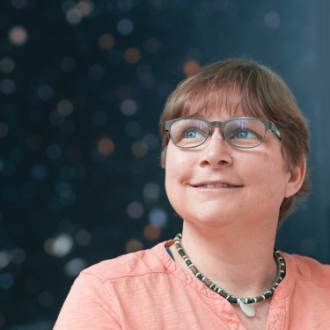Kim McLeod Professor of Astronomy, Wellesley College

My primary research has focused on investigating the growth of galaxies over cosmic time by observing those that have quasars, or actively feeding monstrous black holes, in their centers. I have used near-infrared cameras on ground-based telescopes and on the Hubble Space Telescope to uncover a fundamental relationship between quasars and their host galaxies: the bigger the galaxy, the more massive the black hole can grow. Building upon my earlier work, I have used the Magellan telescope in Chile and the giant Gemini telescope in Hawaii to look at extremely distant quasars. These observations have helped my students and me uncover clues about galaxy formation in the early Universe. I have applied similar analysis techniques to Hubble images of young stars and brown dwarfs in our own Milky Way galaxy. My students and I have helped to discover a protoplanetary disk around one, and possible giant planets around two others.
Despite having observed on the world’s most sophisticated telescopes, my favorite to use is Wellesley’s own beautiful 19th century refractor. I delight in sharing its views with each new crop of students. I also teach a course using Wellesley’s 24” Sawyer telescope with its CCD camera. Term projects might include measuring the passage of an extrasolar planet in front of its own sun, the mass of a planet in our own solar system, the age of a star cluster, or the light profile of a distant galaxy. I also love to teach introductory astronomy courses for nonscientists. Two of my favorites are ASTR100—Life in the Universe (with more than 300 planets now discovered around stars beyond our Sun, there’s something to talk about besides little green men!) and ASTR 101—Stars, Galaxies, and Cosmology (where students learn the truth of that old adage “Astronomy is just physics in de-skies”).
I carry on a suite of outreach activities. I organize public observing nights at Whitin Observatory and arrange for upper-level students to partner with local public elementary school teachers during their astronomy units. I work with the Needham Public Schools on their astronomy curriculum and volunteer with teacher science training, star parties, science fairs, and classroom visits.
When I’m not in my office I can be found spending happy times with my husband and two joyous kids, preferably in activities involving (all of!) fresh air, bluegrass music, and exercise. Someday I will find time to practice playing my mandolin…